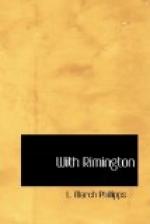“May 1st, 1900.—The long-looked, long-waited for moment has come at last. We march from Bloemfontein on a glorious autumn morning, in fresh cool air and the sky cloudless. Forty miles off Thaba Nchu, that hill of ill omen, might be ten, so bold and clear it stands up above the lower ranges. The level plain between the island hills is streaked with gauzy mist.
“North of Bloemfontein we get into a pretty, uneven country with several level-topped kopjes set end to end like dominoes, and thickets of grey mimosas clustering in the hollows. The great column is moving forward on our left. Big ambulance waggons, with huge white covers nodding one behind the other, high above the press; the naval twelve-pounders, with ten-oxen teams and sailors swinging merrily alongside; infantry marching with the indescribable regular undulation of masses of drilled men, reminding one of the ripple of a centipede’s legs; field artillery, horse artillery, transport waggons, more infantry, more guns—they stretch in a long, dark river right across the plain.
“Now a halt is called. The men drop on one knee where they stand, or hitch up their knapsacks to ease their tired shoulders. Then on again, guns jolting, men sweating, marching at ease, with helmets on wrong side first to shelter their eyes, and rifles with butt-ends over shoulders. They have a rest after a few hours, and fall out by the wayside, fling off the heavy accoutrements, light pipes, and fall a-yarning, stretched on the grass, or pull out scraps of old newspapers to read.”
That was written the day we left Bloemfontein, just a month ago, and 250 miles away. We have come along well, have we not?
Brandfort is a little town on the railway some forty miles north of Bloemfontein, overlooked by a big rocky kopje on the north. Here we find our dear friends once more assembled to meet us after this long interval, and we have a little battle with them, of which I will spare you the description. An incident of some interest was the appearance of the “Irish Brigade” from the Natal side, who held the hill above the town. Rimington got leave from Hutton to turn them out, which he did so cleverly, and taking us at them at such a pace that we did the business without loss, except, indeed, in horses, of which several were hit. I don’t know if the two or three prisoners we took (and that we had some thought of shooting out of hand) were a fair sample of the brigade, but fouler-mouthed scoundrels I think I never set eyes on.
Our plan of advance has been all along very simple and effective. Our centre keeps the railway, while our wings, composed largely of mounted troops, are spread wide on each side, and threaten by an enclosing movement to envelop the enemy if he attempts to make a stand. These tactics have been perfectly successful, and the Boers have been forced again and again to abandon strong positions from a fear of being surrounded. A bear’s hug gives the notion of the strategy. No sooner do our great arms come round than away slip the Boers while there is still time. The Vet River was probably their strongest position, and here they did make some attempt at a stand. This is how things looked that morning:—




